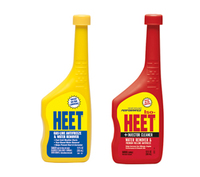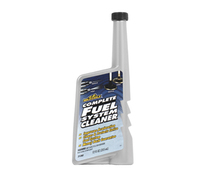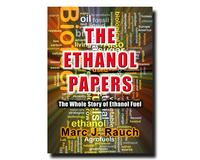Famous Manufacturer of Anti-Ethanol Additives Proves Ethanol's Safety and Benefits
 |
Is It Is, or Is It Ain't?
By Marc J. Rauch
Exec. Vice President/Co-Publisher
THE AUTO CHANNEL
 Marc Rauch |
A funny thing happened on the way to researching a product that's supposed to protect against the "damage" that ethanol can cause to internal combustion engines (ICE) and fuel systems: I discovered that this famous manufacturer of fuel additives must know that the damage they claim is just a load of BS, even though they make and sell a product to protect against the imaginary ethanol damage!
Here are some of the typical imaginary problems caused by ethanol:
1. Ethanol attracts and absorbs any water present (in the air or that it comes in contact with).
2. Ethanol attracts and absorbs water and sits at the bottom of the fuel tank where it rusts the tank.
3. Ethanol damages fuel injectors.
4. Ethanol-gasoline blends shouldn't be used in 2-cycle (small engines).
5. Ethanol causes the build up of gunk, goo, crude, deposits that clog the engine and system.
6. Ethanol causes "varnish" to form in an engine.
7. Ethanol shelf-life is very short and that it goes bad.
8. Ethanol corrodes engine rubbers, plastics, and metals.
 |
To start, ethanol (alcohol) does not attract and absorb any water that is present. This would be a physical impossibility. Ethanol can only absorb a small finite amount of water (4 teaspoons per gallon of pure
ethanol), not "any water that is present" as if it had some unlimited ability to absorb water. As for "attracting" water, Mercury Marine said it best in their
ethanol webinar presentation when they stated:
-
"There is no active transfer mechanism for ethanol molecules to reach out and 'grab' water molecules out of the air..."
The significance in this quote from Mercury Marine, the world's largest manufacturer of marine engines, is that it is presumed that boat engines are the likeliest to experience ethanol-water problems because they operate in an environment surrounded by water. Except by accident, water forms in any fuel tank because of condensation. Condensation is naturally occurring, and it occurs just as naturally when there is no ethanol or no other liquids present. Ethanol does not increase the likelihood for condensation to occur. (I address the entire "hygroscopic" issue in my paper "Ethanol Does NOT Suck Water Out Of The Air".)
If and when water does form from condensation in a fuel tank, GOLD EAGLE recommends using their products HEET and ISO-HEET to remove the water. The HEET products absorb the water, exactly the way that ethanol does. The specific active ingredients of HEET and ISO-HEET are methanol and isopropanol, respectively.
Let's look at how GOLD EAGLE describes the way that their HEET products handle water:
"When HEET is added to the gas tank, it sinks to the bottom and mixes with any water. Since both HEET and water are heavier than gasoline, they go to the bottom of the gas tank. HEET absorbs water and keeps it from freezing in winter and blocking the flow of gasoline through the gas line and fuel pump... (HEET) also removes water and condensation in warm, wet weather. When the vehicle is started, the additives (methanol and isopropanol), water, and gasoline are consumed during combustion inside the engine." (This is a combined quote from the product descriptions for HEET and ISO-HEET)
Amazingly enough, ethanol works precisely the same way: Water is absorbed by the ethanol and then gets vaporized in the combustion process. And if the water that's absorbed by the HEET products don't cause the tank to rust and corrode then ethanol also doesn't cause the tank to rust and corrode. Or, it simply means that if the tank is made of an un-treated material that could rust, then it will rust regardless of whether there is any type of alcohol in the tank - and ethanol-free gasoline would also cause the rust.
Does alcohol damage fuel injectors? Well, let's see what GOLD EAGLE says about HEET and ISO-HEET:
"HEET and ISO-HEET are completely safe on catalytic converters and fuel injectors. ISO-HEET will also safely clean the fuel injectors."
If the alcohols in the HEET products are completely safe on fuel injectors, then ethanol must also be completely safe because, after all, it's just another alcohol. It is interesting that GOLD EAGLE says that ISO-HEET also cleans fuel injectors, but they don't say it about regular HEET. Is there something about isopropanol that's different than methanol? Hmmm. Let me save the answer to this question for the moment. In any event, we know that alcohols are safe for fuel injectors, and catalytic converters, because GOLD EAGLE says so.
For 2-cycle engines, GOLD EAGLE says:
"Only use HEET in 4-cycle gasoline engines. However, ISO-HEET can be used in any type of internal combustion engine (2 cycle, 4 cycle and diesel)."
How do you like that, you can use ISO-HEET in any type of ICE (and apparently any year of manufacture), without causing any harm to the engine whatsoever. What does that mean about ethanol? As it
happens you can mix ethanol with diesel fuel to create eDiesel.
(See: https://www.sciencedirect.com/science/article/pii/S0016236116307797)
So, if ISO-HEET is completely safe to use in any year or size ICE, regardless of the use of the engine, then ethanol must also be safe in any year or size ICE. Cars, trucks, boats, motorcycles, lawn mowers, snowmobiles, new, used, classic...it doesn't matter. If it's safe to use HEET and ISO-HEET in it, then it's safe to use ethanol-gasoline blends. The only question is that there might be a slight difference between ethanol, methanol, and isopropanol - a difference that causes GOLD SEAL to approve the use of ISO-HEET for two-cycle engines, but not regular HEET. I'll be getting to this point pretty soon.
The shelf-life of ethanol. Ha ha ha ha.
I laugh when I hear or read something that claims ethanol has a short shelf life and that it can go "stale." I figure these people must not have any old grandparents or aunts and uncles. I say this because if you do have old people in your family then you know they have some old bottles of ethanol (whisky, gin, rye, scotch, tequila, vodka, or bourbon) lying around the house. And you probably know that if you open a bottle and took a swig, it would taste exactly the way it would have tasted when it was new. Ethanol does not go bad. Alcohol does not go bad. Something that's mixed with the ethanol/alcohol can go bad, but not the ethanol/alcohol. And if you don't have any old relatives with old bottles of ethanol, then they or you would almost certainly have an old bottle of rubbing alcohol (either ethyl alcohol or isopropyl alcohol) in your bathroom cabinet. If you needed to use it as an antiseptic, it would be just as "fresh" as the day it was purchased - it would not be stale, it would not be contaminated, even though it has water in it and is years old.
Let's see what GOLD EAGLE says about the shelf-life of their HEET products:
-
"HEET products do not expire. Unopened bottles of HEET and ISO-HEET have an indefinite shelf life provided the foil safety seal has not been broken."
This means that the alcohols contained in the HEET bottles do not go bad; something that's added to the HEET products might go bad. Methanol doesn't go bad. Isopropanol doesn't go bad. Ethanol does not just go bad.
Does ethanol cause the build up of carbon debris known as gum/gunk/goo/crude and cause a varnish-like substance to form on the engine parts? Of course not, because ethanol burns cleanly, and ethanol
is a very effective solvent - in fact, any alcohol can be used to remove varnish. The question is, can a solvent eliminate and stop the build up of the carbon debris? Yes. In fact, GOLD EAGLE also sells
a product called "COMPLETE FUEL SYSTEM CLEANER." Here's its features:
-
• Clean carburetor, fuel injectors, PCV and intake valves, ports and manifold.
• Helps avoid wasting gasoline caused by accumulated deposits.
• Leaves no oily residue.
• Will not harm catalytic converters or oxygen sensors.
• Stop hard starting, rough idling, stalling and excessive emissions.
 |
Does ethanol cause rubbers, plastics, and metals to corrode? You know, all liquids cause corrosion. As I've said many times in the past, water is the most corrosive of all natural liquids and yet we can safely drink it and swim in it. We can also safely drink ethanol, as long as it isn't mixed with some poison such as gasoline or benzene. Humans can not safely drink or swim in gasoline or benzene (they could, but it would kill them).
In stating that all liquids cause corrosion, do I admit that ethanol can cause corrosion? Absolutely I do. However, ethanol is compatible with more types of rubbers, plastics, and metals than gasoline and aromatics. This means that ethanol doesn't have to be totally NON-CORROSIVE to be a better and safer alternative to gasoline and aromatics, it just has to be less corrosive...and it is.
But the focus of this report is not comparing ethanol to gasoline and aromatics (which I've done in many of my other published articles), the focus is to prove that claims made against ethanol by fuel additive manufacturers are incorrect...or at least gross exaggerations.
GOLD EAGLE emphatically states that its HEET products, and its COMPLETE FUEL SYSTEM CLEANER3 will not damage engines or its parts...they offer a satisfaction guarantee to support the statements. They also state that HEET and ISO-HEET are safe to use in every tankful, in all seasons, all year-round. So if the methanol and isopropanol contained in their products does not damage engines and engine/fuel system parts, how can ethanol cause damage?
The only answer would be that there is a difference between ethanol and the other two alcohols; that there is a difference between methanol and isopropanol; and that ethanol is more corrosive than methanol or isopropanol.
However, this is not the case.
A couple of paragraphs ago, I mentioned that ethanol is compatible with more types of rubbers, plastics, and metals than gasoline and aromatics. Well, ethanol is also more compatible with different rubbers than methanol (methyl alcohol) and isopropanol (isopropyl alcohol). You can see this for yourself by CLICKING HERE and scrolling through the chart.
In addition, Ethanol is more compatible with different metals than methanol (methyl alcohol) and isopropanol (isoprophyl alcohol). See this for yourself by CLICKING HERE and scrolling through the chart.
(NOTE: The comparison charts at the these two websites also indicate that methanol is less compatible with rubbers and metals than isopropanol. This may account for why ISO-HEET can be used in 2-cycle engines, but HEET can not. I presume I may hear directly from GOLD EAGLE about this after I publish and circulate this editorial. If I do, I will append it below.)
If HEET and ISO-HEET are safe and non-corrosive to engine rubbers and metals, then ethanol is even safer and 'more' non-corrosive! - pardon the funky grammar.
Wait, don't go yet, because the story has not ended.
GOLD EAGLE also manufacturers a product called STA-BIL 360 PROTECTION (clearly a play on their old standby STA-BIL). They claim it is America’s #1 ethanol treatment. They claim that it:
-
"Cleans the fuel system to increase power and fuel efficiency and prevents corrosion caused by moisture and today’s ethanol blended fuels."
But, if an engine needs STA-BIL 360 PROTECTION for today's ethanol blended fuels, then the engine should also need STA-BIL 360 PROTECTION to protect it against the corrosion and ill effects of their own HEET and COMPLETE FUEL SYSTEM CLEANER products since they work in the exact same way that ethanol does, and don't forget that methanol and isopropanol are more corrosive than ethanol.
It is, or it ain't. They can't have it both ways...alcohol either damages engines and parts, or it cleans them and helps to prevent the damage that is actually caused by gasoline and aromatics.
The reason that additive companies are against ethanol-gasoline blends is that putting ethanol into gasoline makes their aftermarket products redundant. To quote Mercury Marine's ethanol webinar again:
-
"No fuel additive can prevent ethanol from acting as a solvent."
If ethanol's solvent characteristics are bad for engines, then so are GOLD EAGLE's products. If the solvent characteristics of GOLD EAGLE products are beneficial, then the ethanol in ethanol-gasoline blends is also beneficial...and it saves money, too, because you don't have to buy a GOLD EAGLE additive every time you fill up your engine(s).
And, if engine repair guys, auto manufacturers, small equipment manufacturers, and your neighborhood know-it-alls don't object to the fuel additives (made by GOLD EAGLE and other manufacturers), then they should zip up their mouths before criticizing ethanol-gasoline fuels!!!
1 Ethanol-gasoline blends obviously replace the need for products like Dry Gas and HEET.
2 The blend of solvents could include things like benzene, turpentine, acetone, heptane, cyclohexane, chloroform, and/or tetrachloroethylene. However, these solvents are more corrosive than ethanol.
3 Gold Eagle's Complete Fuel System Cleaner product was discontinued sometime after the publication of this report. They have also tried to remove any vestiges of the webpage. I guess they read what I wrote and couldn't handle the truth.
• SEE ALSO: Automotive Aftermarket Saturated with Snake Oil Engine Additives
 |


